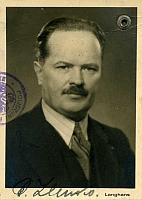Zlenko, Petro (Andriiovych, 1891–1954) – Materials from Personal and Family Inheritance
Petro Zlenko (6 June 1891, Starokostiantyniv – 1 October 1954, Taishet) was a Ukrainian and Czechoslovak bibliographer, journalist and publisher, an employee of the Slavonic Library.
He was born in the town of Starokostiantyniv in the Volhynian Voivodeship to the family of a teacher. In 1909, he took his school-leaving exam at the grammar school in the town of Ananyiv in the Odessa Governorate. In the same year, he was admitted to the Faculty of Mathematics and Physics of Novorossiysk University in Odessa. In 1912, he transferred to the same faculty of the Imperial University of St Volodymyr in Kyiv. During the First World War, the university was evacuated to Saratov, where Petro and his first wife Tatiana went as well. In Saratov, Zlenko received a certificate of the completion of six semesters. He was probably mobilized. He attended a one-year officer’s course at the Prince Sergei Artillery School in Odessa, after which he as a non-commissioned officer joined the artillery regiment of the Russian Tsarist Army.
After the declaration of Ukrainian independence, Zlenko enlisted in the Ukrainian army. As a warrant officer of the 12th Artillery Division of the Army of the People’s Republic of Ukraine, he moved at the beginning of 1920 to Poland, where he spent several months in a camp for interned soldiers. After his release from the camp, he taught physics and mathematics at a private grammar school in Brest. The opportunity to complete his university studies brought Petro Zlenko to Prague in the autumn of 1923. In 1928, he graduated there from the Mykhailo Drahomanov Ukrainian Pedagogical Institute. He also completed his studies at the State Librarian School, then he worked as a librarian at the Mykhailo Drahomanov Ukrainian Pedagogical Institute until it was closed in 1933.
In 1936–1945, Zlenko was employed as a cataloguer at the Slavonic Library in Prague. At the same time, he devoted himself to professional work, collaborating with the editors of various bibliographic publications. He was active in the organisations of the Ukrainian diaspora in Czechoslovakia, especially in the Taras Shevchenko Scientific Association and in the Ukrainian scouting organisation Plast. In 1932–1938, he published and edited the magazine Ukraïns’kyi tyzhden’ (Ukrainian Week). He collaborated with the journals Spudei, Knyholiub, Literaturno-naukovyi visnyk, Tryzub, Slovanská knihověda, Časopis československých knihovníků, Ukrajina and several others.
In August 1937, Petro Zlenko acquired Czechoslovak citizenship. On 2 February 1944, he married Marie (Marina) Pinkasová, née Brezinová.
On Friday, 6 July 1945, Zlenko was arrested in his Prague flat by members of the NKVD SMERSH unit and illegally transported to the USSR. He was transferred from the prison in Horlivka in the Donbass region to camp No. 033 in Taishet in the Irkutsk region, where he died on 1 October 1954.
Petro Zlenko’s collection comes from the literary estate of his widow Marie Zlenková and her nephew Pavel Brezina. It contains the basic personal materials enabling the preparation of Zlenko’s detailed biography: documents concerning the life of the Zlenko family in Tsarist Russia, Petro Zlenko’s education in Russia and Czechoslovakia, various identification cards, the marital status certificate, and documents related to the acquisition of Czechoslovak citizenship. A large part of the collection comprises photographs depicting both Petro Zlenko and his relatives (especially Marie Zlenková) as well as his colleagues and friends over a relatively long period of time (mostly from 1905 until 1940s).
A relatively large collection of the correspondence of Marie Zlenková with various persons and institutions has also been preserved, which makes it possible to trace the fates of Petro Zlenko after his arrest and abduction. It mostly includes Zlenko’s letters to his wife from places of imprisonment, the letters sent to Marie from Ukraine by Zlenko’s mother Liudmila, as well as the correspondence received from Czechoslovak state institutions.
